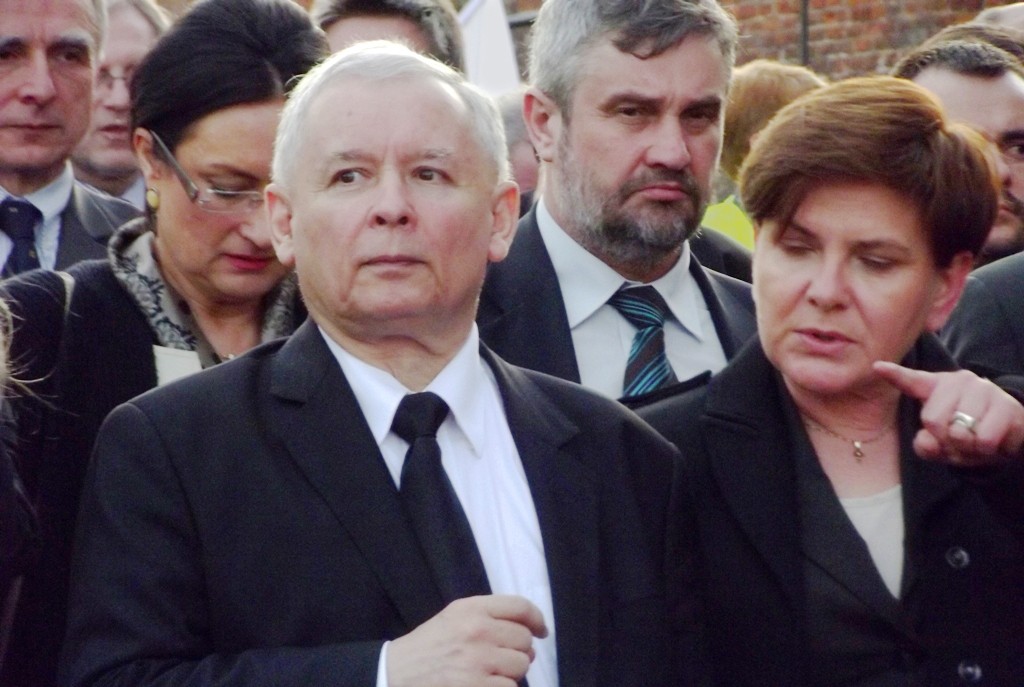In 2015, Law and Justice has gained full executive power. It happened in a particularly unexpected manner, even for the leaders of Kaczyński’s party. At the beginning, as a result of a good election campaign of Andrzej Duda and the poor campaign of the then president, Bronisław Komorowski, Duda has become the head of the state. Afterwards, due to lack of motivation and blatant ineptitude of Civic Platform as well as the specifics of the Polish electoral system which favours big parties over the small ones, Law and Justice obtained 38% of the votes and has won outright majority in the Parliament.
The first steps of the currently ruling party and the opposition were dominated by a memory of the 2005-2007 coalition, in which Law and Justice was the leader. What was characteristic of this government was the great self- confidence and the will to combat the ‘system’. The ‘system’ is the word that Law and Justice politicians commonly use to describe the opponents of their vision of state which is based on entrenched cultural conservatism including also the elements of nationalism.
Obviously, attributing to Law and Justice inclinations towards fascism shall be considered a misunderstanding. Law and Justice’s vision of a state goes back to the times of a majoritarian, illiberal democracies, to the times of omnipotent, a somewhat authoritarian state but is still far from the totalitarian one. This vision is also related to the spirit of the Second Polish Republic of 1918-39, searching for the balance between the neighbourhood with aggressive Russia and the economically stronger Germany. The problem Law and Justice’s politicians experience with the acceptance and understanding of European integration stems from the fact that they often deem EU a structure dominated by Germany, executing political ideas of Chancellor Merkel.
The last time Law and Justice lost power very quickly. Its coalition with the populist Self Defence of the Republic of Poland party and the nationalistic League of Polish Families was very unstable, deprived of the cooperation and trust between the partners. Nowadays, when Law and Justice is the outright majority in parliament, it is trying not to lose an opportunity for introducing a durable, systemic and cultural change in Poland.
The first steps of Law and Justice are the result of the past experience gained in the years 2005-2007. The leaders of the party believe that they lost the power because of:
-
a negative attitude of the media which was criticizing the violation of liberal democracy and the rule of law,
-
uncompromising attitude of the Constitutional Tribunal which was blocking the legislations violating the civil rights guaranteed by the Polish Constitution,
-
the lack of the control over the judicial system; between 2005 to 2007, the Minister of Justice, enjoyed himself when executing public lynches: accusations of corruption, abuse, provocations against the political opponents as well as inconvenient coalitionists – the accusations often either appeared to have no real basis or were dropped due to the illegal investigation methods applied within the process,
-
neglecting social programs contributing to the support of the impoverished social groups.
The diagnosis of the reasons for the former failure thus influences the present actions of the ruling party. Law and Justice declared a war on the Constitutional Tribunal, trying to change the balance of powers inside the court by questioning the judges’ election by the former Civic Platform majority (2 out of 5 judges elected by the previous parliamentary majority were actually unlawful), electing their own candidates strongly related to the ruling party. Therefore Law and Justice adopted the legislation which assumed the rule of the qualified majority voting while taking judicial decisions in the Constitutional Tribunal. This was made to enable judges elected by the Law and Justice majority to halt any possible future judicial decisions not taken in accordance with the will of the ruling party.
The next target is media. Starting with the public ones, taken over by Law and Justice in the blink of an eye, where the information flow is managed by the ruling party – only opinion journalists retained some relative freedom. The media which show disapproval of the government are punished by halting the advertisements of the state-dependent companies or relinquishment from the subscription of anti-government press by the official state bodies.
Furthermore, the reason for combining the function of the General Prosecutor and Minister of Justice was the need to investigate and convict the real and imaginary enemies of the state. One of the main Law and Justice’s aims has always been to combat corruption. Hence they desire quick successes supported by the judicial decisions.
Social safety must be assured by the social programmes. One of them is currently being implemented: the infamous PLN 500 per child. The main goal of this project is to combat the decrease in birth rate. Regardless of its noble cause, the members of Law and Justice privately claim that they actually do not believe in the effectiveness of the programme and its influence on rates. The main beneficiaries of the project are the traditional families with many children – mainly conservative supporters of the Law of Justice party who might notice the improvement in their situation. The costs of the programme will be covered by consumers through indirect taxes imposed on the banking and retail sectors.
The first steps of Law and Justice were thus designed to prevent the 2007 scenario from occurring once again. By the end of 2007, Kaczynski’s party had alreadybeen doomed to fail in the elections and eventually lost the power. Consequently, the party became the reason for electing equally conservative Civic Platform. Due to the lack of a two-third majority which would enable Law and Justice to change the Constitution officially and to implement the ideas similar to those of Hungarian Prime Minister Victor Orban, the governing party is often hovering on the edge of breaching the Constitution.



